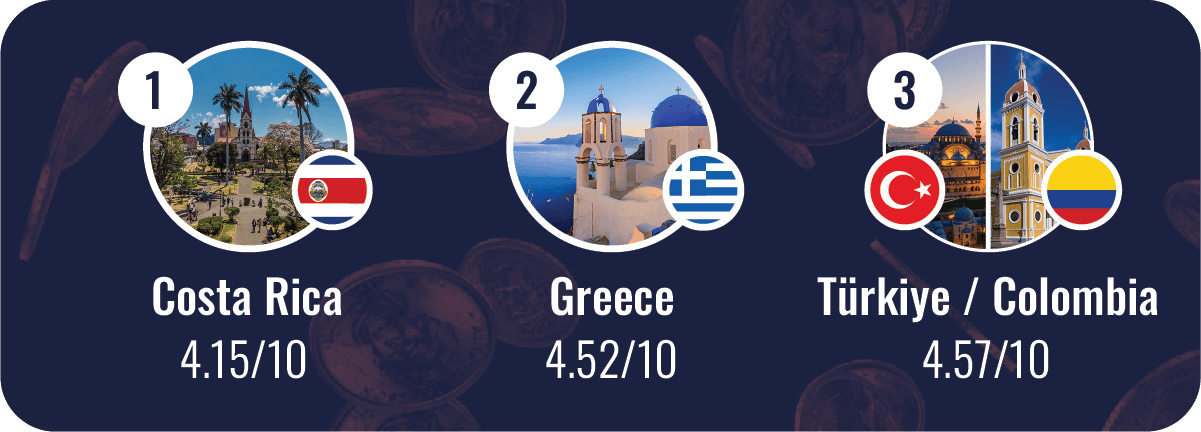The Burrow
Finances, bills and money are one of the biggest causes of stress in our lives, and the same is true in nations across the world. Watching your salary get chewed up by an increasing cost of living is enough to make anyone worried.
Mortgages and home loan repayments are perhaps the biggest source of financial stress to the average family, in addition to rent and the price of necessities. To get an understanding of which countries are feeling more financially stressed than others, the home loans experts at Compare the Market have crunched the numbers on property prices, rent, salary, unemployment rates and the average cost of living in 34 OECD countries.
Each country had a score assigned depending on how it performed across these metrics. The lower the score, the more financially stressed people in this country could feel.

Score: 4.15/10
Metrics:
– Property prices per m2 – US$1,938
– Monthly rent – US$1,033
– Monthly salary – US$842
– Unemployment rate – 16.43%
– Monthly cost of living – US$2,714
Costa Rica was ranked as the most financially stressed nation of 34 OECD countries with a score of 4.15/10. While they had the lowest property prices per square metre, Costa Rica had the highest unemployment rate at 16.43%, and the fifth-lowest average monthly salary of US$842.39.
Score: 4.52/10
Metrics:
– Property prices per m2 – US$4,488
– Monthly rent – US$801
– Monthly salary – US$842
– Unemployment rate – 12.43%
– Monthly cost of living – US$2,646
The second most-stressed country in the ranking was Greece, with a score of 4.52/10. Greece scored poorly based on several different factors, such as the fourth-highest unemployment rate and seventh-lowest average monthly salary – though Greece did have the 10th cheapest average rent per month.
Score: 4.57/10
Metrics:
– Property prices per m2 – US$5,680
– Monthly rent – US$456
– Monthly salary – US$379
– Unemployment rate – 12.03%
– Monthly cost of living – US$1,363
Rounding out the top three financially stressed countries was a tie between Türkiye and Colombia, who both scored 4.57/10. Despite having the second-lowest cost of living at US$1,363 and the second-cheapest rent at US$456 per month, Türkiye was weighed down by having the fifth-highest unemployment rate at 12.03% and the second-lowest average salary per month at US$379.
Colombia also ranked highly for financial stress due to having the second-highest unemployment at 13.81% and the smallest average monthly salary of US$297. Colombia was kept from scoring even lower due to having the cheapest rent of US$398 a month and the second-cheapest property prices at US$2189 per m2.

Score: 7.29/10
Metrics:
– Property prices per m2 – US$16,467
– Monthly rent – US$1,868
– Monthly salary – US$6,029
– Unemployment rate – 5.10%
– Monthly cost of living – US$5,857
Switzerland had the highest score of all 34 countries in our index, suggesting that it is the least financially stressed country. This is largely because Switzerland had the highest average monthly salary at US$6,029, and in our ranking the average salary was weighted higher than other metrics (see the below to learn more about how we calculated the index). Their high income helped overcome having the highest cost of living, fourth-highest average property prices and fourth-highest monthly rent of all 34 countries.
Score: 6.52/10
Metrics:
– Property prices per m2 – US$5,306
– Monthly rent – US$1,652
– Monthly salary – US$3,585
– Unemployment rate – 4.47%
– Monthly cost of living – US$3,926
Denmark was the second-highest ranking country with a score of 6.52/10. Like Switzerland, a large part of why they scored so highly was their average monthly income score. Denmark had the fourth-highest monthly average salary at US$3,585. While the country had the third-highest cost of living at US$3,926 per month on average, Denmark did better in house prices and monthly rent than several other countries on the list.
Score: 6.46/10
Metrics:
– Property prices per m2 – US$7,325
– Monthly rent – US$1,248
– Monthly salary – US$3,007
– Unemployment rate – 3.03%
– Monthly cost of living – US$3,191
Following behind Denmark was their southern neighbour, Germany. Germany scored 6.46/10 and took out third place due to their low unemployment of 3.03% (fourth-lowest out of all nations on the index). The nation had the ninth-highest average salary at US$3,007 per month. Germany also did well on average property prices per square metre and rent in comparison to other countries.
Australia had a score of 6.19, ranking very highly and tying with Belgium for seventh place on the index. Australia scored well on monthly salary at US$3,759, which was the third-highest of all 34 countries. Australia had the tenth-lowest unemployment rate at 3.70% which also helped it rank well.
One area where Australia scored poorly was on average monthly rent. Australia had the second-most expensive average rent per month at US$2,436, coming behind the USA at US$2,775 per month.
![]()
The country with the lowest income was Colombia, where the average monthly earning is US$297. This is US$5,732 per month less than Switzerland, which had the highest monthly salary.

Costa Rica had the highest unemployment rate of the 34 OECD countries on our index at 16.43%, which is 11.34% higher than the Czech Republic, who had the lowest unemployment rate at 2.4%.
![]()
Based on a price per square metre for capital city two-bedroom properties, the United Kingdom had the highest average property price at US$26,262 per square metre. This was US$24,324 per m2 more than Costa Rica, who had the cheapest price per m2 for property.
![]()
The USA had the highest average monthly rent at US$2,775. This is US$2,377 more per month than Colombia, who had the lowest average monthly rent of US$398.
![]()
It was Switzerland that had the highest average cost of living, with a family of four facing an average cost of US$5,857 per month. This is US$4,597 more per month than the lowest average cost of living, which was in Colombia.
A mortgage to pay for a home can be one of the largest causes of financial stress, as it requires a serious long-term investment to keep a roof over your head. Compare the Market’s General Manager of Money, Stephen Zeller, says that comparing home loans can make a significant difference to your financial stress.
“Comparing your options and finding a better deal could be the difference between sinking or swimming when it comes to your loan repayments,” says Zeller. “Even what seems like a minor improvement in your rate could mean a difference of thousands of dollars over the course of your home loan.”
“Comparing options can also help you look at other aspects of a mortgage like application fees, offset accounts, payment schedules and redraw facilities. It only takes a few minutes and can make a huge impact on your finances when you proceed to apply for a mortgage.”
We analysed five different sets of data for 34 OECD countries. For each of these five metrics, the country was given a score out of 10. The lower the score, the worse a country performed for that dataset. A weighted average was then calculated using these five different scores for each country, with 50% weighting for the average salary and 50% for the remaining scores. The list below links to each source and explains what each point of data means:
N.B. Some of these data sources are regularly updated and are subject to change. Data is correct as of 06/02/2023.
* Finland’s average monthly rent data was missing from the data source listed above. For the purposes of our calculations, Finland was given an average score for that metric based on all other countries included in the index when calculating a score out of 10.